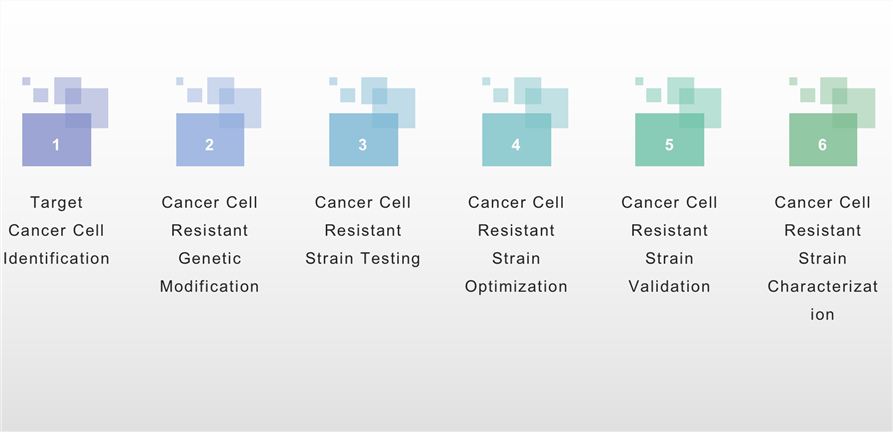Welcome to Creative Biolabs, where we combine a panel of technology and expert services to provide world-class support for the construction of CRO services for multi-cancer cell-resistant strains. Our experienced team of professionals is focused on meeting the needs of the biotechnology industry, providing comprehensive solutions to drive innovation and accelerate research in cancer biology.
Introduction
Currently, Creative Biolabs can develop genetically engineered cells or organisms that are designed to be resistant to cancer. Our service involves the manipulation of the genetic material of the cells to enhance their ability to fight off and resist the growth and spread of cancer cells. We mainly offer two cell line construction strategies:
One approach to developing a cancer cell-resistant strain could involve genetic engineering to create cells that have enhanced abilities to repair and protect themselves from DNA damage caused by cancer-causing agents. This could involve manipulating the cells' DNA repair pathways, increasing their ability to detect and repair mutations, and boosting their immune response to prevent cancer cell growth.
Another approach could involve using CRISPR technology to target and modify specific genes within cancer cells to make them more susceptible to existing treatments, such as chemotherapy or radiation therapy. By targeting key genes involved in drug resistance or survival, our scientists could potentially make cancer cells more sensitive to treatment and less likely to develop resistance.
 Fig.1 Cancer Cell Resistant Strain Construction Service Process. (Creative Biolabs Original)
Fig.1 Cancer Cell Resistant Strain Construction Service Process. (Creative Biolabs Original)
Services
Creative Biolabs provides a complete set of cancer cell-resistant strain construction, verification, and other services to help our valued clients find better ways to combat this devastating disease. Our team of highly trained professionals is dedicated to delivering top-of-the-line services that meet the unique needs and demands of our customers. From the initial design and construction of cancer cell-resistant strains to the comprehensive verification process, we ensure that every step is carried out By incorporating specific genetic modifications and markers, we can develop cells that are not only resilient to cancer but also faithfully represent the disease in a laboratory setting. In the verification stage, we utilize a range of assays and tests to confirm the resistance and stability of the constructed strains to ensure the cells are functioning as intended.
STEP 1: Firstly, we will identify the specific type of cancer cell that the strain will be resistant to. This could be a well-known cancer cell line, such as HeLa cells, or a patient-specific cancer cell type.
STEP 2: Once the target cancer cell has been identified, we will genetically modify the strain to make it resistant to the cancer cell. Till now, we have equipped various techniques, such as gene editing using CRISPR-Cas9.
STEP 3: After the genetic modifications have been made, the strain must be tested to ensure that it is indeed resistant to the target cancer cell. In our labs, we usually expose the strain to the cancer cells in vitro and monitor their growth and survival.
STEP 4: If the resistance is not sufficient, further genetic modifications may be needed by us to enhance the strain's resistance to the cancer cells. This could involve tweaking the expression levels of certain genes or adding additional resistance mechanisms.
STEP 5: Once the strain has been optimized, it must be validated in vivo using cancer animal models. Our designed models can help determine the strain's efficacy in a more complex biological environment and provide valuable data for potential future testing applications.
STEP 6: Finally, the cancer cell-resistant strain should be thoroughly characterized by our labs to understand its mechanisms of resistance and potential side effects. It will be crucial for further development and potential clinical translation of the strain.
Case Study
Through years of research and development, Creative Biolabs has successfully developed a range of cancer cell-resistant strains that have shown significant promise in preclinical studies. These strains have been engineered to be more resilient to existing treatments, thereby improving their efficacy in killing cancer cells. Our experienced team of researchers has meticulously analyzed the data obtained from these studies to ensure the reliability and credibility of our findings.
In a recent study, we have identified BRCA1 which plays a crucial role in the development of resistance in breast cancer cells. we used CRISPR-Cas9 to knock out BRCA1 genes in a strain of yeast and tested its efficacy against breast cancer cells. The results showed that the engineered yeast strain significantly inhibited the growth of cancer cells compared to a control strain.
Meanwhile, we have targeted a specific PI3K/AKT pathway that is known to be involved in drug resistance in breast cancer cells. We used CRISPR-Cas9 to disrupt this pathway in E. coli and tested its ability to kill breast cancer cells. The data have shown that the engineered E. coli strain can effectively target and kill the cancer cells, while the control strain had minimal effect.
Creative Biolabs understands the unique challenges that come with developing therapies for multi-cancer cell cell-resistantins. That's why we have partnered with leading market biological companies to access the latest tools and resources to support our clients in their drug discovery efforts. So whether you're looking to outsource your cancer cell cell-resistant development efforts or simply need support in building a competitive advantage in the market, we invite you to explore the possibilities with our company. Please contact us to learn more about our services and how we can help your projects.
For Research Use Only | Not For Clinical Use


 Fig.1 Cancer Cell Resistant Strain Construction Service Process. (Creative Biolabs Original)
Fig.1 Cancer Cell Resistant Strain Construction Service Process. (Creative Biolabs Original)
 Download our brochure
Download our brochure